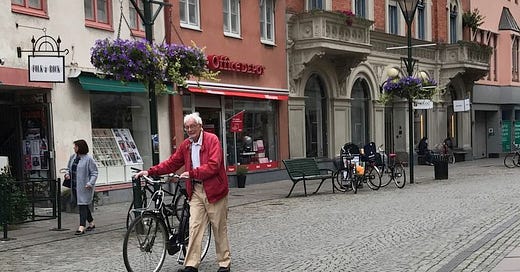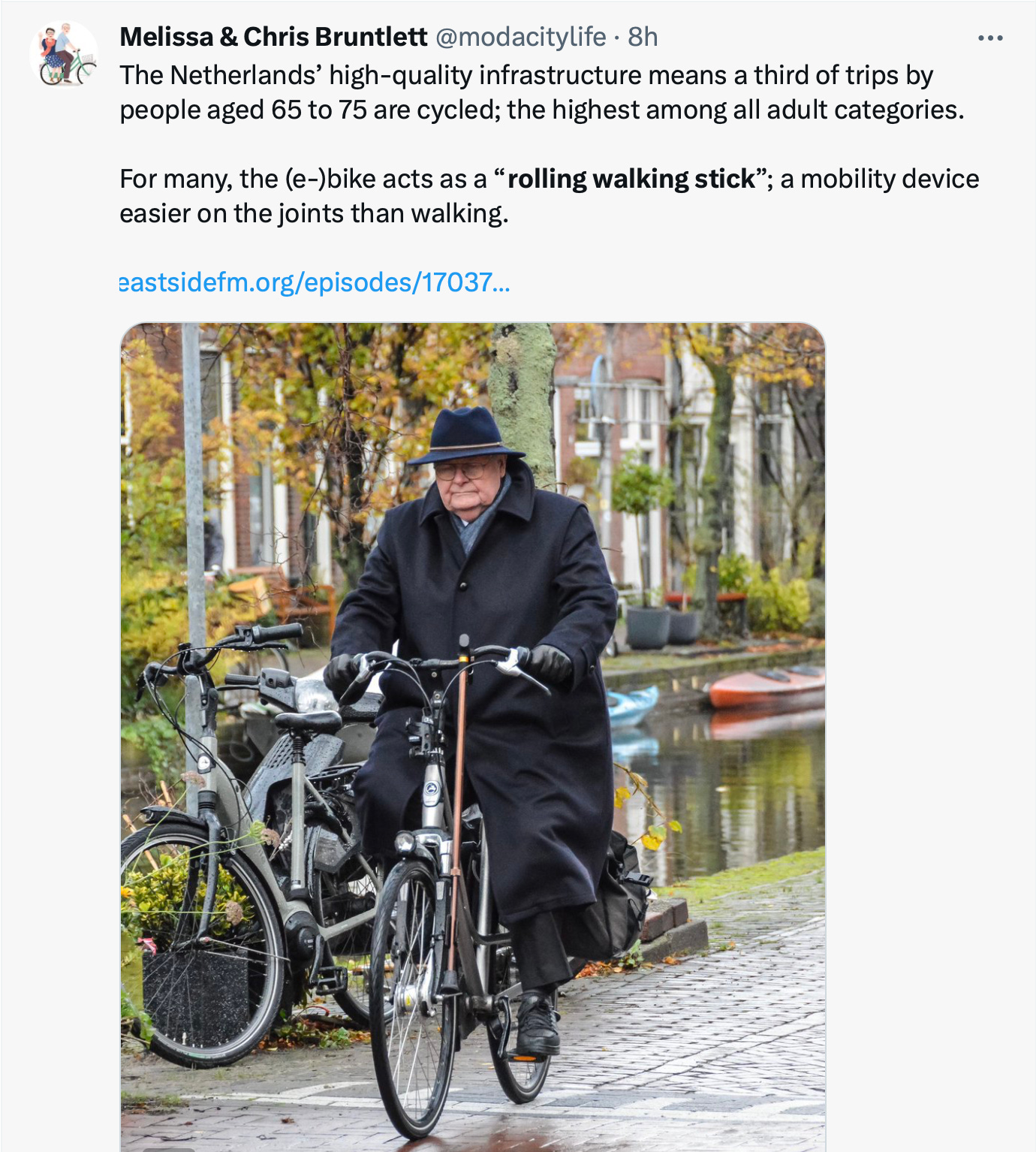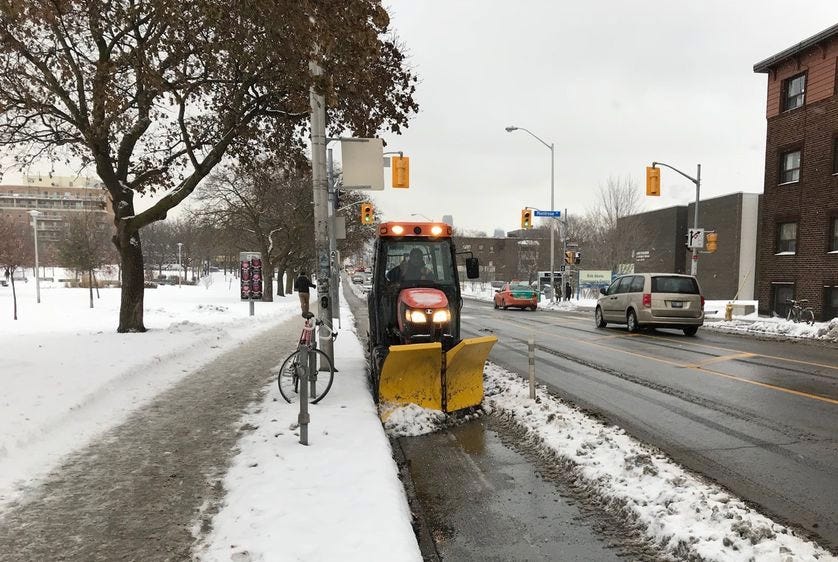From the archives: Boomers and bikes were made for each other
There are alternatives to driving that can work just about anywhere.
From 2012 to 2020, Treehugger was owned by the Mother Nature Network, where I wrote regularly about the problems of aging in our cities and suburbs. Many of them did not get reposted to Treehugger but are still relevant, So I am going to repost some of them here over the holidays. Back to our regular programming tomorrow! From January, 2018:
Alex Steffen once wrote in the late lamented Worldchanging discussion forum:
There is a direct relationship between the kinds of places we live, the transportation choices we have, and how much we drive. The best car-related innovation we have is not to improve the car but to eliminate the need to drive it everywhere we go.
One of the problems we face as aging baby boomers is that most of us live in the kinds of places where we don't have many transportation alternatives to driving. And while many people can drive safely well into old age, others cannot. Reaction times slow significantly. According to one study, "… it takes a 60-year-old driver 9 seconds to recover from undergoing a road glare, whereas this only takes 2 seconds for someone who is 30. Reaction times are also 22 times slower for someone who is 65, compared to a 30-year-old."
For many, losing a driver's license is a significant negative milestone. One expert told CBC News: "It's been demonstrated and said many times, that receiving the news that you will be losing your driver's license has the same weight as being diagnosed with cancer."
Even in cities where there are relatively good para-transit systems, it's a seriously time-consuming endeavor, and cities are cutting back on eligibility because it costs so much money. When she was well into her 90s, my mom had to prove she was actually incapable of walking any distance to be eligible. But she could also get pushed in her wheelchair to a number of restaurants and stores since she lived in the city. People who live in suburbs have it far worse than she did; they can become trapped. Joseph Stromberg wrote in Vox:
Once seniors stop driving, those who remain in suburban homes are marooned in an environment designed to be traversed by car. The most obvious problem, says Stephen Golant, a gerontologist at the University of Florida, is access to goods and services. But seniors who are isolated also have worse health outcomes and lower life expectancies, even after adjusting for preexisting health conditions and other factors. This may be because they're less likely to get health advice and monitoring from family and friends and also because they miss the emotional benefits of regular human contact.
A lot of people are hoping that self-driving cars will save us. Others fight any attempt to limit the freedom of people to drive anywhere anytime. Mayor Bill deBlasio of New York recently objected to congestion charges because "old people have to drive to their doctors." Whenever I write on TreeHugger about limiting cars in cities, I'm told that disabled people can’t take transit and we can’t have bike lanes because they have to be able to park in front of stores and doctors' offices.
But I'm not alone in thinking there are alternatives that will let many (not all) age well and live longer because they don't drive. In Cambridge, U.K., huge numbers of older and disabled people ride bikes — an incredible 26 percent of the population with disabilities. Many people who have trouble walking say cycling is easier; many have tricycles or recumbent bikes that are easier to ride. According to Laura Laker in the Guardian:
In the context of an ageing global population, mobility experts are increasingly seeing cycling as a way to help people with disabilities move around cities independently. A bike can act as a “rolling walking stick”; yet looking at its owner you wouldn’t know they had a disability: around 40% of disabled cyclists simply use a regular two-wheeled bike. For two out of three disabled cyclists, riding a bike is easier than walking, easing joint strain, aiding balance and relieving breathing difficulties. According to recent research by Transport for London, 78% of disabled people are able to cycle, while 15% sometimes use a bike to get around.
On Average Joe Cyclist, Joe shows how bikes can actually help people get back into better health:
Here are three case studies of seniors who have come back from illness by exercising on electric bikes. The challenges they faced included multiple heart attacks, cancer, neurological problems, and stroke. But they didn’t let that stop them – they got out there on e-bikes, and they kept on exercising and enjoying life! Because of cycling on e-bikes, they have all enjoyed an improvement in their health, and a better quality of life. And they are all bravely modelling how NOT go gently into that good night.
I've written previously about how we all need to get at least 30 minutes of physical activity every day. If you look at a 15-minute bike-shed, it is a pretty big area, at least 4 miles on a slow moving e-bike; that covers a lot of territory.
It's time for a rethink. Instead of demanding that cars go everywhere and park anywhere, perhaps it's time to demand good bike infrastructure that works for cyclists of all abilities. In the same Guardian article, one advocate notes that all bike facilities are not equal.
Neil Andrews of Wheels for Wellbeing says there are “some examples of good facilities and infrastructure out there” but “by and large they are few and far between”. “Without consistently good inclusive infrastructure and facilities, disabled cyclists are unable to complete a journey,” he says. “That means many people simply won’t attempt a journey in the first place.” Disabled people are the canary in the coalmine for healthy streets – if disabled people are using your streets in high numbers, you are doing something right.
I was thrilled this week to see that where I live, they are finally taking cycling seriously enough to have special ploughs to clear the lanes, like they do in Copenhagen. I wrote earlier "that instead of waiting for someone to take away our car keys, we should be figuring out the alternatives about how to live without a car right now."
One of those alternatives is a nice bike or e-bike. Of course it isn’t for everyone, but for many, it could improve their lives and replace their cars.







I envy the relative ease I see in Europe as they integrate multiple forms of wheeled transportation with pedestrians on the street. Arlington, Virginia, where I live is described as very bike friendly but that I think mainly refers to the off road network of trails for bikes and walkers. But we also have a good system of buses so personally I choose to walk and use buses and subway. There are senior bikers here but I sense that many are lifelong bikers as in Europe.
OK, once more with VIGOR, Lloyd! As I have remarked on a number of occasions, all this may well be fine and dandy in a city (I can see some of what you say applied to my "Boston era" 50 years ago but much less so in my suburban "teenager growing up years".
Now do rural areas. You have a cottage by a lake (as you have told us in the past). How would all of these tactics/techniques translate? Now add in smaller rural roads, some hills and don't forget mountains and blizzards. Recursively show your "work of solutions".
Better yet, how would your students "solve for X"?